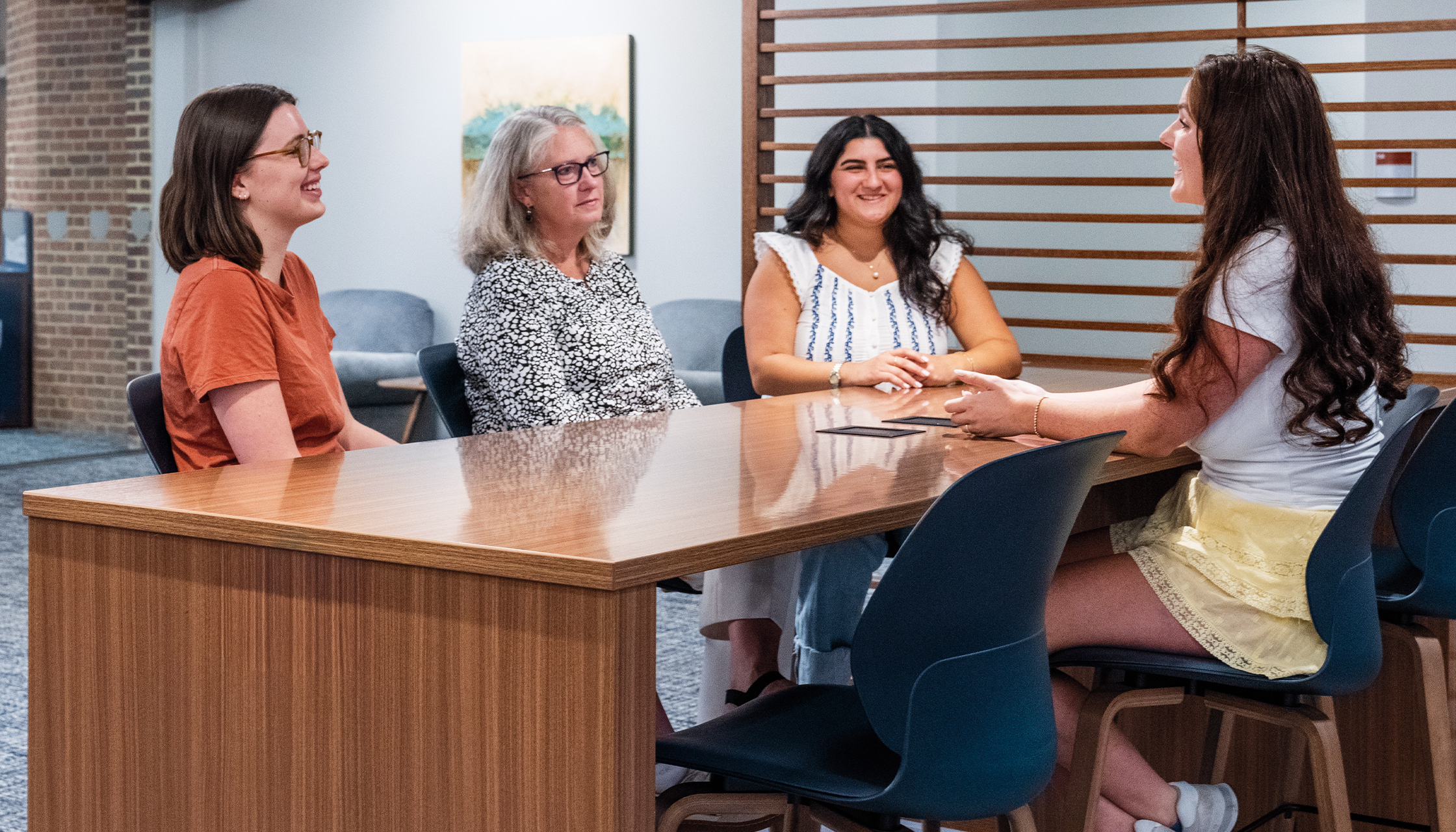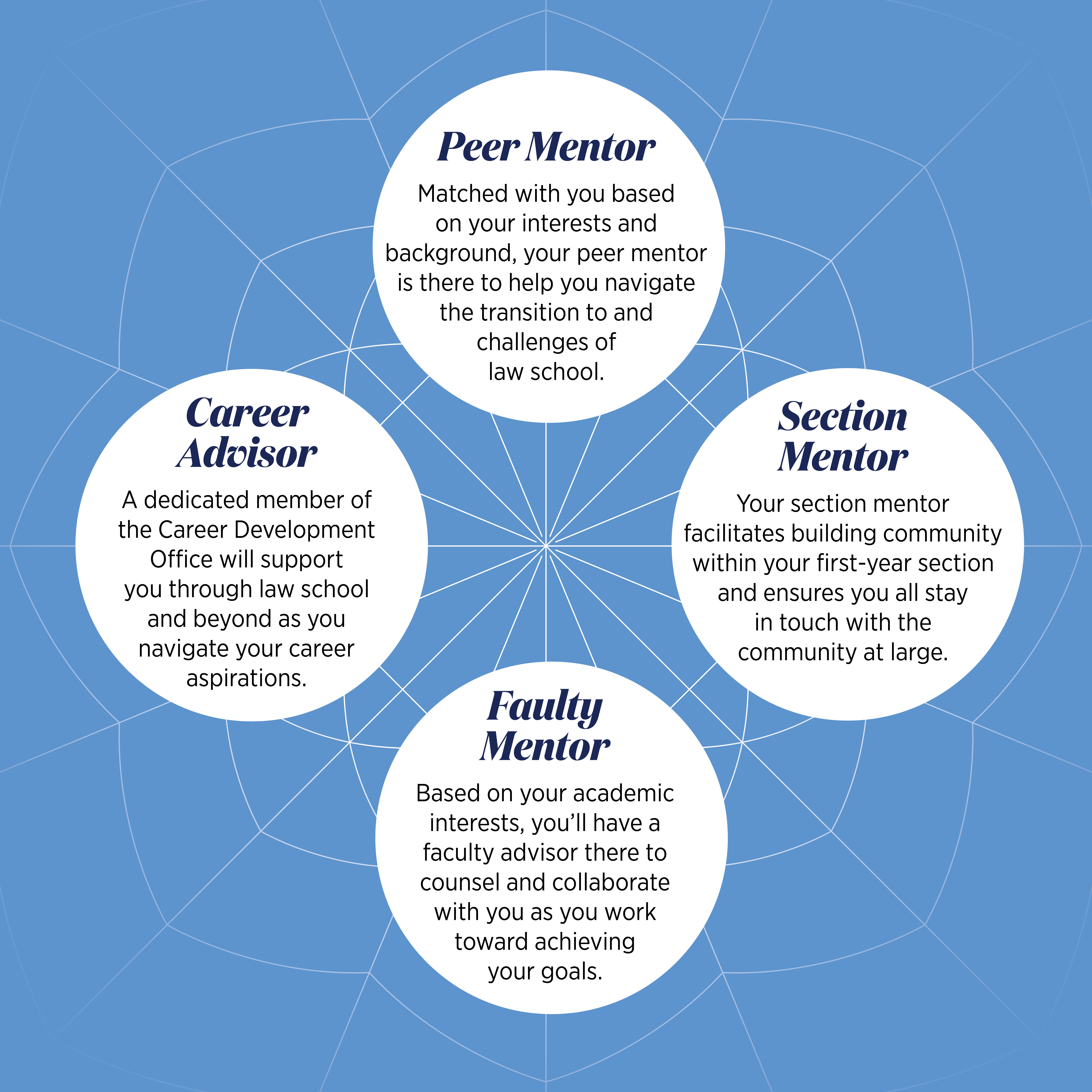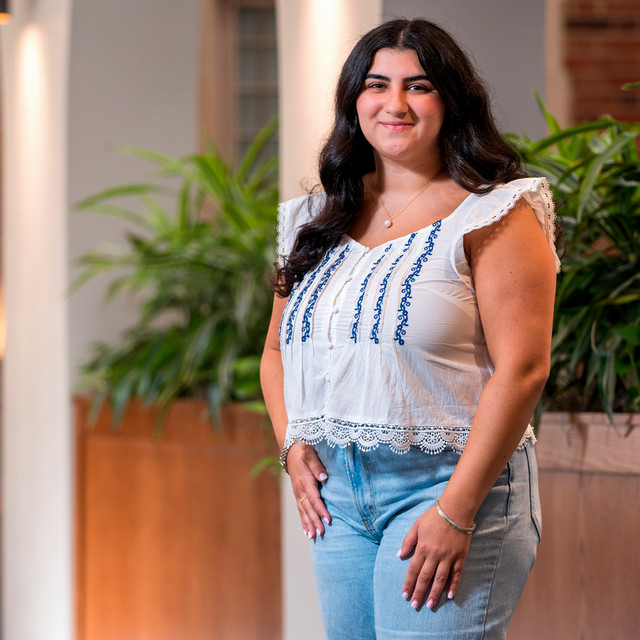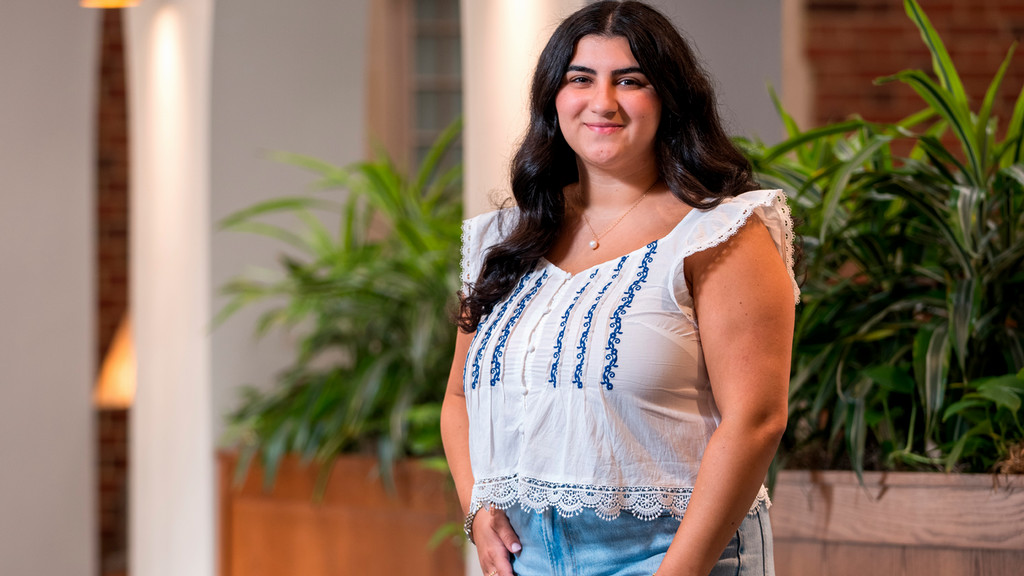Mentorship sits at the center of Richmond Law’s student experience, something Lara Ballout, ’24 and L’27, knows well. She spent the summer following her 1L year as an intern with a federal magistrate judge in Norfolk, Virginia, and her law school mentors helped her through every step. From her career advisor — who shared the opportunity with Ballout — to her upperclassmen peers — who advised her based on their previous judicial internships — Ballout wasn’t surprised to find guidance for each question.
The choice to pursue her law degree at her alma mater was easy. “For me, the biggest thing about Richmond is the community,” Ballout said. “I love that there’s an open-door policy with all of our professors, and there’s also such amazing opportunities inside and outside of the classroom.”
Every 1L is assigned four distinct mentors: peer mentor, student section mentor, faculty mentor, and career advisor. Ballout also connected with upperclassmen, professors, and alumni for advice ranging from potential careers to how to navigate law school. It’s the community that forms the foundation of Richmond Law, and that community begins with the first step into the building.
A Bridge to Law School
While considering the judicial internship, Ballout wanted an on-the-ground perspective of what to expect for both the interview and the experience. She immediately turned to her peer and student section mentors. Beyond their titles, they were two of the first people at law school whom she called friends.
“The peer mentor and the section mentor are going through it at the same time as us,” Ballout said. “Sometimes the school takes a more structured, formal approach, but [at times you need] the perspective of someone who’s done it or has personal experience.”
At the simplest level, the peer and student section mentors are fonts of information about classes, professors, careers, and extracurriculars. But they also connect 1Ls to the rest of the law school. Since the 1L class is largely isolated from the upper classes at first, peer and student section mentors integrate 1Ls into the community by helping them acclimate to law school and facilitating meetings with peers.
As Ballout’s peer mentor, Anna Bickley, L’26, was available for any individualized mentorship from formal check-ins over coffee to informal text messages during the day. Bickley also shared her experiences with the University of Richmond Law Review and her interest in a clerkship as Ballout explored career options.
The opportunity to be a mentor is what Bickley considers a chance to reflect on the lessons she has learned so far.
“Lara can always come to me. It’s not like once she gets to her second year, I’ll never speak to her again. I think I will always be an older person she can come to, and she will always be someone I check in on and look out for.”
“Law school moves quickly. All of a sudden, you’re a 2L, and someone’s asking you for advice, and you’re like, ‘I have no advice to give. I’m still figuring it out,’” Bickley said. “But at the same time, it means that 1L year feels so recent to me, so I can say to [Ballout], ‘I remember when I was going through that. Please let me help you.’”
While Bickley guided Ballout on an individual level, Becca Herzog, L’26, oversaw Ballout and a group of approximately 30 1Ls as a student section mentor. Herzog served as an orientation leader and hosted formal events and informal gatherings throughout the year. For example, she partnered with another section mentor to host a conversation about class registration over Taco Bell.
Section mentors also met monthly with Laura Webb, associate dean of student success, to discuss concerns and provide an eyewitness report of the 1L class’s progress. During the meetings, 3L section mentors offered advice to 2L mentors about how to respond to specific situations. These conversations allowed Webb to relay larger issues to the other deans.
Mentorship requires both Bickley and Herzog to filter their experiences in ways that are constructive for Ballout. They emphasize being able to identify the most pertinent advice to one’s goals.
“You are going to get so much advice in the next three years of your time here,” Herzog told her 1L section. “What you need to do is take what works for you and leave what doesn’t, and that’s going to look different for each one of you.”
For Ballout, what began as formal mentorship transformed into friendships that branched out beyond academics and careers. She and Herzog bonded over their shared hometown of Midlothian and experiences living with family while attending law school.
Bickley, who prioritizes her well-being through yoga and time with friends outside of Richmond Law, passed that wisdom on to Ballout. “Lara can always come to me,” Bickley said. “It’s not like once she gets to her second year, I’ll never speak to her again. I think I will always be an older person she can come to, and she will always be someone I check in on and look out for.”
Signposts to the Future
Meredith Harbach, professor of law, arranges her fall semester schedule each year to focus on her 1L course on civil procedure and its accompanying office hours. While part of her organizational strategy is to offer more office hours for this complex course, the other part is to have ample time for the 1Ls who come to her with questions outside of class.
“As much as [mentorship is] imparting information, I also feel like it’s listening and trying to meet our students where they are,” Harbach said. “Often, that’s academically and professionally. Sometimes, that’s also personally.”
Ballout was among a group of civil procedure students who visited Harbach frequently for advice about issues they faced while acclimating to law school — issues both academic and personal. “[Professor Harbach] would tell us the various different routes we could take to do something, but then she would also tell us the consequences or what potentially positive things come out of it,” Ballout said.

“Every student has their own strengths, their own goals, their own path, And not everyone’s path looks the same.”
Although Harbach wasn’t one of Ballout’s official mentors, she quickly became someone the latter could turn to with questions about class registration and what a potential career as a law professor would look like.
Both Harbach and Professor Jonathan Stubbs, Ballout’s faculty mentor, were essential in building her values as a lawyer. When Ballout received conflicting opinions about which classes were important when pursuing specific careers, Stubbs reminded her that the best classes to take were topics that mattered to her.
“Every time I talk to Professor Stubbs, he always brings it back to, ‘Why did I come to law school? Why am I doing the things that I’m doing? Why do I care about certain topics, and what makes me passionate about the law?’” Ballout said.
In the Career Development Office, Carole Yeatts, ’90, Ballout’s career advisor, echoes a similar philosophy with each of her advisees. The one-on-one mentorship over three years allows Yeatts’ guidance to evolve with Ballout’s interests.
“What we try to do with the Career Development Office is give a tailored approach to advising [each of] our students,” Yeatts said. “Every student has their own strengths, their own goals, their own path, and not everyone’s path looks the same.”
Yeatts describes her role as a coach who teaches Ballout how to search for jobs and market her strengths to potential employers. Yeatts utilizes the school’s network of alumni, including former advisees, for insight into the practice of law, a technique she considers the best way for Ballout to find a suitable career.
When Ballout was struggling to obtain an internship, Yeatts directed her to the opportunity with the Norfolk magistrate judge and prepared her for the interview. “My philosophy is, ‘We’re here to give the students the tools they need not just to find a summer job and not just to find their first job after graduation but also to find the job after that,’” Yeatts said.
Harbach calls Richmond Law’s approach the long view of professional development. The classroom is the starting point, but the importance of faculty and career mentors is to help students develop a holistic professional identity that will serve them alongside legal knowledge far into their future careers.
The Definition of Community
Back when Herzog was an incoming 1L, she attended a social event for 1Ls and section mentors. Although she spoke with her own section mentor, she fondly recalls one of the other mentors who initiated a conversation.
“I always thought the best kind of mentor was not somebody who was necessarily assigned to somebody but was always willing to be in those shoes for people,” Herzog said. “I think that there is a great sense of community, and that only comes from people who are willing to connect. It cultivates the culture that we have at Richmond, which is one of collaboration.”
That culture not only thrives from mentor to mentee, but also the opposite direction. Mentees have just as much value in the mentorship relationship, Yeatts said. “They sometimes think they don’t know enough or haven’t experienced enough or don’t have much to offer, [but] ask anyone who serves as an official or unofficial mentor for a law student. The mentor gets as much joy and value out of the relationship as the mentee does.”
Ballout’s first year affirmed her reasons for continuing her studies at Richmond. And as she entered her second year as a peer mentor, the cycle began anew.
“Mentorship at Richmond has really shown me a community and support system no matter what kind of problem I’m having, big or small,” Ballout said. “It’s really nice having that voice of reason affirming that you’re meant to be in law school.”

Students benefit from a web of mentoring support throughout their education at Richmond Law.

